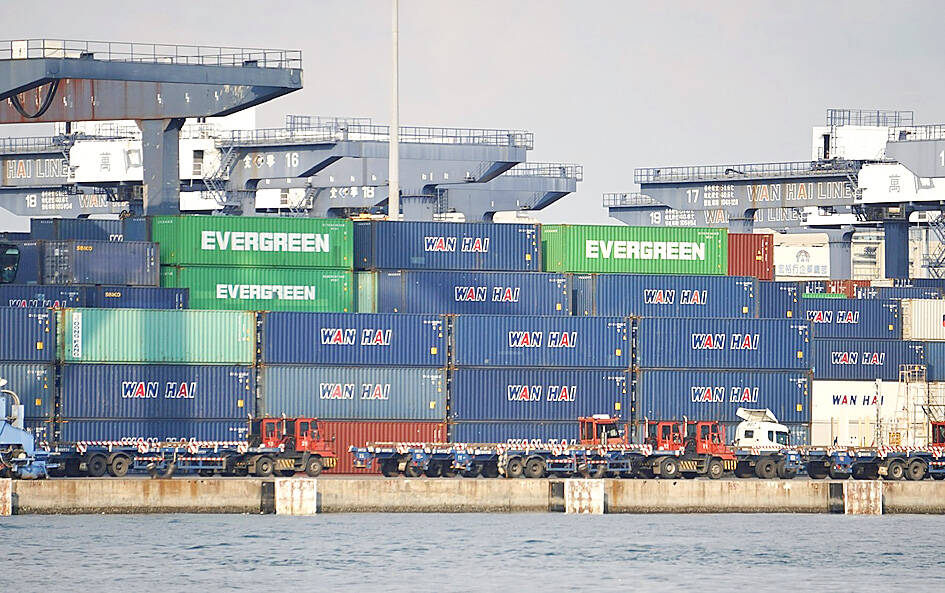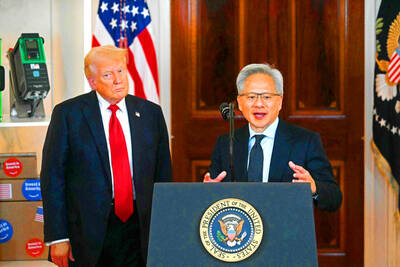Taiwan’s exports to Mexico surged to a record level as tech companies moved production out of China, but the trade now faces uncertainty following US threats of higher tariffs on its neighbor.
Taiwanese exports to Mexico jumped 479 percent last month from a year earlier to reach US$2.7 billion, official data showed. This is mainly driven by shipments of graphic processing units, a key components of artificial intelligence (AI) servers.
The Ministry of Finance in a statement on Friday said the surge was largely due to supply chain shifts, as companies like Hon Hai Precision Industry Co (鴻海精密) — also known as Foxconn Technology Group (富士康科技集團) — and Wistron Corp (緯創) have been building factories in Mexico to assemble AI servers destined for the US.

Photo: CNA
The trade now seems at risk after US President Donald Trump announced late last month that he would impose 25 percent tariffs on imports from Mexico and Canada. The decision was later delayed for 30 days after last-minute negotiations, but the threats have caused stock prices of Taiwanese tech companies to plunge.
Last month, Trump also announced plans to impose 100 percent tariffs on computer chips from Taiwan. Minister of Economic Affair J.W. Kuo (郭智輝) on Saturday said that a group of officials would travel to the US to meet with Trump administration officials to try and stop the tariffs from being implemented.
In addition, Taiwan is preparing to buy more liquefied natural gas (LNG) from the US to reduce its trade surplus and potentially avoid higher tariffs.
State-owned CPC Corp, Taiwan (CPC, 台灣中油) and the ministry are in negotiations with an Alaska-based export plant for supplies, state-run Central News Agency reported on Sunday, citing an unidentified ministry official.
Trump on Friday said Japan would buy a record volume of US LNG, following a meeting with Japanese Prime Minister Shigeru Ishiba at the White House.
Last year, Taiwan imported about 10 percent of its LNG from the US, with most shipments arriving from Australia and Qatar under long-term supply contracts, official data showed.

Taiwan Semiconductor Manufacturing Co (TSMC, 台積電) last week recorded an increase in the number of shareholders to the highest in almost eight months, despite its share price falling 3.38 percent from the previous week, Taiwan Stock Exchange data released on Saturday showed. As of Friday, TSMC had 1.88 million shareholders, the most since the week of April 25 and an increase of 31,870 from the previous week, the data showed. The number of shareholders jumped despite a drop of NT$50 (US$1.59), or 3.38 percent, in TSMC’s share price from a week earlier to NT$1,430, as investors took profits from their earlier gains

AI TALENT: No financial details were released about the deal, in which top Groq executives, including its CEO, would join Nvidia to help advance the technology Nvidia Corp has agreed to a licensing deal with artificial intelligence (AI) start-up Groq, furthering its investments in companies connected to the AI boom and gaining the right to add a new type of technology to its products. The world’s largest publicly traded company has paid for the right to use Groq’s technology and is to integrate its chip design into future products. Some of the start-up’s executives are leaving to join Nvidia to help with that effort, the companies said. Groq would continue as an independent company with a new chief executive, it said on Wednesday in a post on its Web

CHINA RIVAL: The chips are positioned to compete with Nvidia’s Hopper and Blackwell products and would enable clusters connecting more than 100,000 chips Moore Threads Technology Co (摩爾線程) introduced a new generation of chips aimed at reducing artificial intelligence (AI) developers’ dependence on Nvidia Corp’s hardware, just weeks after pulling off one of the most successful Chinese initial public offerings (IPOs) in years. “These products will significantly enhance world-class computing speed and capabilities that all developers aspire to,” Moore Threads CEO Zhang Jianzhong (張建中), a former Nvidia executive, said on Saturday at a company event in Beijing. “We hope they can meet the needs of more developers in China so that you no longer need to wait for advanced foreign products.” Chinese chipmakers are in

POLICY REVERSAL: The decision to allow sales of Nvidia’s H200 chips to China came after years of tightening controls and has drawn objections among some Republicans US House Republicans are calling for arms-sale-style congressional oversight of artificial intelligence (AI) chip exports as US President Donald Trump’s administration moves to approve licenses for Nvidia Corp to ship its H200 processor to China. US Representative Brian Mast, the Republican chairman of the US House Committee on Foreign Affairs, which oversees export controls, on Friday introduced a bill dubbed the AI Overwatch Act that would require the US Congress to be notified of AI chips sales to adversaries. Any processors equal to or higher in capabilities than Nvidia’s H20 would be subject to oversight, the draft bill says. Lawmakers would have